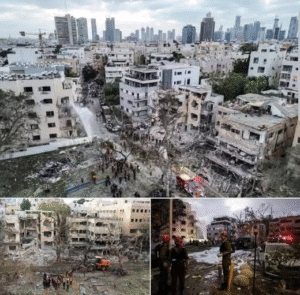Tensions in the Middle East have escalated rapidly, with the death toll from Iran’s recent attacks on Israel rising to 25, including eight fatalities reported in just the last few hours. The situation remains volatile, as military operations continue and both sides brace for further escalations. The attacks mark a significant escalation in the already fragile relationship between the two nations and have sparked international concern.
According to official reports, the Iranian assault involved a combination of missile and drone strikes targeting multiple locations within Israel. The strikes began late in the evening and continued into the early morning hours, catching many civilians off guard. Air raid sirens were activated across several cities, prompting thousands to seek shelter. The Israel Defense Forces (IDF) confirmed that several key infrastructures were targeted, including military bases and strategic communication centers.
Among the casualties are both military personnel and civilians. The IDF stated that eight of the most recent deaths occurred during a concentrated missile barrage that struck a residential area near the northern city of Haifa. Emergency services were quickly dispatched, but several buildings collapsed, and rescue efforts have been complicated by ongoing security threats and secondary explosions. Medical teams continue to treat dozens of wounded, many of whom remain in critical condition.
Prime Minister Benjamin Netanyahu held an emergency meeting with top defense and intelligence officials, vowing that Israel would respond “with strength and determination.” In a televised address, he stated, “This is a direct act of aggression. We will defend our people and our sovereignty. Iran will be held accountable.”
The Iranian government has not denied responsibility. Instead, a spokesperson from Tehran described the strikes as “a necessary and justified response to repeated Israeli provocations,” referencing past Israeli airstrikes in Syria and alleged covert operations. Iran’s leadership claimed that the attack was targeted, aiming only at military assets, though Israeli officials dispute that, citing civilian deaths and damage to non-military infrastructure.
The international community has reacted with alarm. The United Nations Security Council convened an emergency session to discuss the rapidly unfolding crisis. UN Secretary-General António Guterres issued a statement urging “maximum restraint” from all parties and warning that continued violence could ignite a broader regional war.
The United States, a close ally of Israel, condemned the attacks in the strongest terms. President Joe Biden released a statement calling Iran’s actions “an unacceptable escalation” and reaffirmed America’s “ironclad support for Israel’s right to defend itself.” He has reportedly ordered the deployment of additional naval assets to the eastern Mediterranean as a precaution.
European leaders echoed similar sentiments. French President Emmanuel Macron and German Chancellor Olaf Scholz both called for de-escalation but condemned the loss of civilian life. Meanwhile, some countries in the region, including Syria and Lebanon, have expressed cautious support for Iran’s actions, framing them as retaliatory in nature.
The Israeli military has since launched counteroffensives targeting Iranian-linked positions in Syria and Iraq. Airstrikes reportedly hit weapons depots and logistics routes used by Iranian-backed militias. While Israel has not officially confirmed its role in these counterattacks, regional media outlets have reported explosions in areas known to host pro-Iran forces.
Back in Israel, scenes of devastation and anxiety have overtaken the nation. Schools in affected areas have been closed, and non-essential public gatherings have been suspended. Hospitals are operating on high alert, and additional security forces have been deployed to key locations.
Families of the victims have begun to speak out. In one heartbreaking case, a father of three described how his home was destroyed in the night, killing his wife and youngest son. “There was no warning, no time to run. We were asleep. I woke up under rubble,” he said. The tragedy has amplified public anger and calls for a decisive military response.
Humanitarian organizations, including the Red Crescent and the Israeli Red Magen David, are working on the ground to provide medical aid and shelter for displaced families. The death toll is expected to rise as more people remain missing beneath debris and hospitals continue to treat critical injuries.
The attacks have also triggered protests across Israeli cities, with thousands taking to the streets, waving flags and chanting slogans in support of the military. While many demand retaliation, others call for international mediation and a long-term diplomatic solution to avoid further bloodshed.
Economically, the conflict has already begun to have ripple effects. The Tel Aviv Stock Exchange dropped sharply following news of the attacks. Oil prices spiked amid fears of regional instability affecting supply routes. Investors remain wary as uncertainty continues to grow.
Military analysts warn that the situation could spiral if Hezbollah, the Iranian-backed militant group based in Lebanon, becomes actively involved. So far, the group has issued statements of solidarity with Iran but has not launched any new attacks. The Israeli military has increased surveillance and readiness along its northern border in anticipation of potential developments.
Iran’s Revolutionary Guard has issued warnings of further action if Israel responds with full-scale military strikes. In a televised address, a top Iranian commander said, “This is only the beginning. If Israel dares to attack our homeland directly, the consequences will be severe and far-reaching.”
Both nations have faced pressure from allies and adversaries alike to prevent full-scale war. Despite the escalations, some diplomatic backchannels reportedly remain open. Qatar and Turkey have offered to mediate, though no formal negotiations have begun. Experts believe that any de-escalation will require both sides to make difficult concessions, something neither appears willing to do at this time.
As of now, the death toll stands at 25, with dozens more injured and communities across Israel in mourning. The eight deaths reported in the last few hours underscore the intensity and suddenness of the violence. The possibility of further attacks looms large, and citizens are being urged to remain vigilant.
For now, the world watches closely as two bitter rivals inch closer to the brink of war. The question remains: will diplomacy prevail, or is this the start of a larger and more devastating conflict?


